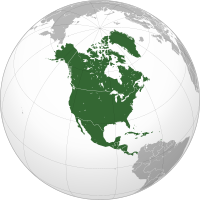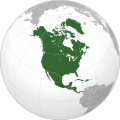Portal:North America
The North America Portal

North America is a continent in the Northern and Western Hemispheres. North America is bordered to the north by the Arctic Ocean, to the east by the Atlantic Ocean, to the southeast by South America and the Caribbean Sea, and to the west and south by the Pacific Ocean. The region includes the Bahamas, Bermuda, Canada, the Caribbean, Central America, Clipperton Island, Greenland, Mexico, Saint Pierre and Miquelon, Turks and Caicos Islands, and the United States.
North America covers an area of about 24,709,000 square kilometers (9,540,000 square miles), representing approximately 16.5% of the Earth's land area and 4.8% of its total surface area. It is the third-largest continent by size after Asia and Africa, and the fourth-largest continent by population after Asia, Africa, and Europe. As of 2021[update], North America's population was estimated as over 592 million people in 23 independent states, or about 7.5% of the world's population. In human geography, the terms "North America" and "North American" can refer to Canada, the United States, Mexico, and Greenland or, alternatively, Canada, Greenland and the US (Mexico being classified as part of Latin America) or simply Canada and the US (Greenland being classified as either Arctic or European (due to its political status as a part of Denmark) and Mexico classified as Latin American).
It is unknown with certainty how and when first human populations first reached North America. People were known to live in the Americas at least 20,000 years ago, but various evidence points to possibly earlier dates. The Paleo-Indian period in North America followed the Last Glacial Period, and lasted until about 10,000 years ago when the Archaic period began. The classic stage followed the Archaic period, and lasted from approximately the 6th to 13th centuries. Beginning in 1000 AD, the Norse were the first Europeans to begin exploring and ultimately colonizing areas of North America.
In 1492, the exploratory voyages of Christopher Columbus led to a transatlantic exchange, including migrations of European settlers during the Age of Discovery and the early modern period. Present-day cultural and ethnic patterns reflect interactions between European colonists, indigenous peoples, enslaved Africans, immigrants from Europe, Asia, and descendants of these respective groups. (Full article...)
King's Highway 61, commonly referred to as Highway 61 and historically known as the Scott Highway, is a provincially maintained highway in the Canadian province of Ontario. The 61-kilometre (38 mi) route connects the Pigeon River Bridge, where it crosses into the United States and becomes Minnesota State Highway 61, with a junction at Highway 11, Highway 17 and the Harbour Expressway in Thunder Bay. The highway forms part of the Lake Superior Circle Tour.
Highway 61 was added to the highway system on October 6, 1937, following the amalgamation of the Department of Northern Development into the Department of Highways. Prior to that it was known as the Scott Highway. The bridge over the Pigeon River was originally known as The Outlaw, as it was constructed without formal approval of the Canadian or American governments. (Full article...)

Ann Weldy (born September 15, 1932), better known by her pen name Ann Bannon, is an American author who, from 1957 to 1962, wrote six lesbian pulp fiction novels known as The Beebo Brinker Chronicles. The books' enduring popularity and impact on lesbian identity has earned her the title "Queen of Lesbian Pulp Fiction". Bannon was a young housewife trying to address her own issues of sexuality when she was inspired to write her first novel. Her subsequent books featured four characters who reappeared throughout the series, including her eponymous heroine, Beebo Brinker, who came to embody the archetype of a butch lesbian. The majority of her characters mirrored people she knew, but their stories reflected a life she did not feel she was able to live. Despite her traditional upbringing and role in married life, her novels defied conventions for romance stories and depictions of lesbians by addressing complex homosexual relationships.
Her books shaped lesbian identity for lesbians and heterosexuals alike, but Bannon was mostly unaware of their impact. She stopped writing in 1962. Later, she earned a doctorate in linguistics and became an academic. She endured a difficult marriage for 27 years and, as she separated from her husband in the 1980s, her books were republished; she was stunned to learn of their influence on society. They were released again between 2001 and 2003 and were adapted as an award-winning Off-Broadway production. They are taught in women's and LGBT studies courses, and Bannon has received numerous awards for pioneering lesbian and gay literature. She has been described as "the premier fictional representation of US lesbian life in the fifties and sixties", and it has been said that her books "rest on the bookshelf of nearly every even faintly literate Lesbian". (Full article...)

The convict cichlid (Amatitlania nigrofasciata) is a fish species from the family Cichlidae, native to Central America, also known as the zebra cichlid. Convict cichlids are popular aquarium fish and have also been the subject of numerous studies on fish behaviour. (Full article...)
Did you know...
- ...that the proposed Atlantica trade bloc would economically tie New England in the U.S. to the Atlantic Provinces of Canada?
- ...that Calico Jack (pictured), an English pirate captain during the early 18th century, was executed with most of his crew in Jamaica on 17 November 1720?
- ...that Navassa Island off the west coast of Haiti is claimed by the United States as an unorganized unincorporated territory?
- ... that Raul Macias, a Cuban-Mexican boxer parlayed his popularity into a successful career in telenovelas?
- ...that Jacob Piatt Dunn in 1886 wrote the first scholarly history concerning the Indian Wars?
Selected panorama

Topics
Categories
List articles
Related portals
Northern America
Central America
Caribbean
WikiProjects
 North America
North America-
 Canada
Canada -
 Greenland
Greenland -
 Mexico
Mexico -
 Saint Pierre and Miquelon
Saint Pierre and Miquelon -
 United States
United States  Central America
Central America-
 Belize
Belize -
 Costa Rica
Costa Rica -
 El Salvador
El Salvador -
 Guatemala
Guatemala -
 Honduras
Honduras -
 Nicaragua
Nicaragua -
 Panama
Panama  Mesoamerica
Mesoamerica Caribbean
Caribbean-
 Antigua and Barbuda
Antigua and Barbuda -
 Bahamas
Bahamas -
 Barbados
Barbados -
 Bermuda
Bermuda -
 Cuba
Cuba -
 Dominica
Dominica -
 Dominican Republic
Dominican Republic -
 Grenada
Grenada -
 Haiti
Haiti -
 Jamaica
Jamaica -
 Puerto Rico
Puerto Rico -
 Saint Kitts and Nevis
Saint Kitts and Nevis -
 Saint Lucia
Saint Lucia -
 Saint Vincent and the Grenadines
Saint Vincent and the Grenadines -
 Trinidad and Tobago
Trinidad and Tobago
Associated Wikimedia
The following Wikimedia Foundation sister projects provide more on this subject:
-
Commons
Free media repository -
Wikibooks
Free textbooks and manuals -
Wikidata
Free knowledge base -
Wikinews
Free-content news -
Wikiquote
Collection of quotations -
Wikisource
Free-content library -
Wikiversity
Free learning tools -
Wikivoyage
Free travel guide -
Wiktionary
Dictionary and thesaurus


























